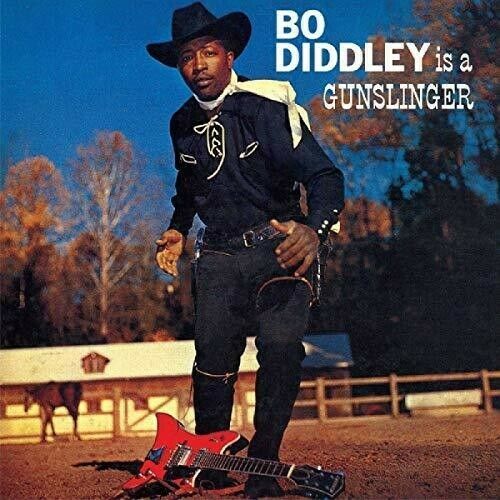Bo Diddley’s album covers are irresistible, his beat hypnotic, and so it goes with his fifth long-player, 1961’s Bo Diddley is a Gunslinger. Dressed as Bonanza’s sharpest guest star, Diddley stands above his Gretsch Jupiter Thunderbird, poised for a quick-draw and another batch of songs built around his signature sound: a tremolo-drenched guitar hanging on one note, chugging along to The Bo Diddley Beat, the primitive “bomp, ba-bomp-bomp, bomp-bomp” that transformed his six-string into an agent of percussion.
Rock ‘n’ roll’s pioneers lived in the third-person, thriving on swagger, but no more so than Diddley, each album another chapter of self-mythologizing cosplay. He is at once the ringleader, the jester, the roustabout. These records could have been mere novelty were it not for Diddley’s exuberance and sincerity. There’s also his singular devotion to the bare minimum. No rock ‘n’ roller has done more with less, yet his records are thick with the hallmarks of exhilaration– catcalls, call-and-response, tambourines, maracas, studio chatter, and signifying.
Diddley had only one song in the Top 40, 1958’s “Say Man”, but Gunslinger plays like a mid-century hit parade. His best records evoke crashing a party that started hours ago. The unofficial theme “Gunslinger” catches you up to speed: Bo Diddley’s armed and doesn’t suffer nonsense, but there’s more charm than menace in his vigilante justice. Likewise with “Ride on Josephine”, a hellbent companion to Chuck Berry’s “Maybelline” that conjures Rock, Rock, Rock, not The Magnificent Seven.
Like any party worth trespassing, Gunslinger soon abandons its theme and gives itself to dance. Diddley delivers “Doing the Crawdaddy”, with the immortal incentive: “If you do the crawdaddy right, I’m gonna buy you a popsicle tonight!” The motormouth, spell-it-out “Cadillac” rockets along, loose but never unglued, while “Cheyenne” vaguely returns to the western motif, but it’s the groove that’s essential, not the narrative.

Despite these movers, the album’s showpiece is the heart-stop of a ballad “Somewhere”. “Somewhere, over the rainbow,” Diddley croons, and for a moment you might think he is offering his take on the Harold Arlen/Wizard of Oz standard. But this is Bo’s song, a forlorn slow burn, haunting in the way the best early rock ‘n’ roll ballads memorialized a heartache that is ancient, universal, and unresolvable. Mid-song, Diddley breaks down, breaking character– “You know can’t nobody else/take me away from you”– and the party is over, even if he regains enough composure to make it through the final verse.
Of rock ‘n’ roll’s first wave of pioneers, Diddley has perhaps become the most overlooked. He didn’t die young or fall into scandal; he didn’t endure the redemptive arc that we ask of our icons. Instead, he died in 2008, aged 79, lacking the requisites for infamy. Yet his beat and braggadocio are part of our cultural DNA, and his barebones ethos has provided a game plan for countless DIY movements, from punk to hip hop. Check out Slovenly Records’ tribute, He’s Bad: 11 Bands Decimate the Beats of Bo boxset for the most recent reminder of Diddley’s legacy.
Over the course of his records, Bo Diddley was a lot of things– a gunslinger, a lover, a traveler, a gladiator– but he was always the man, the architect, the originator.
